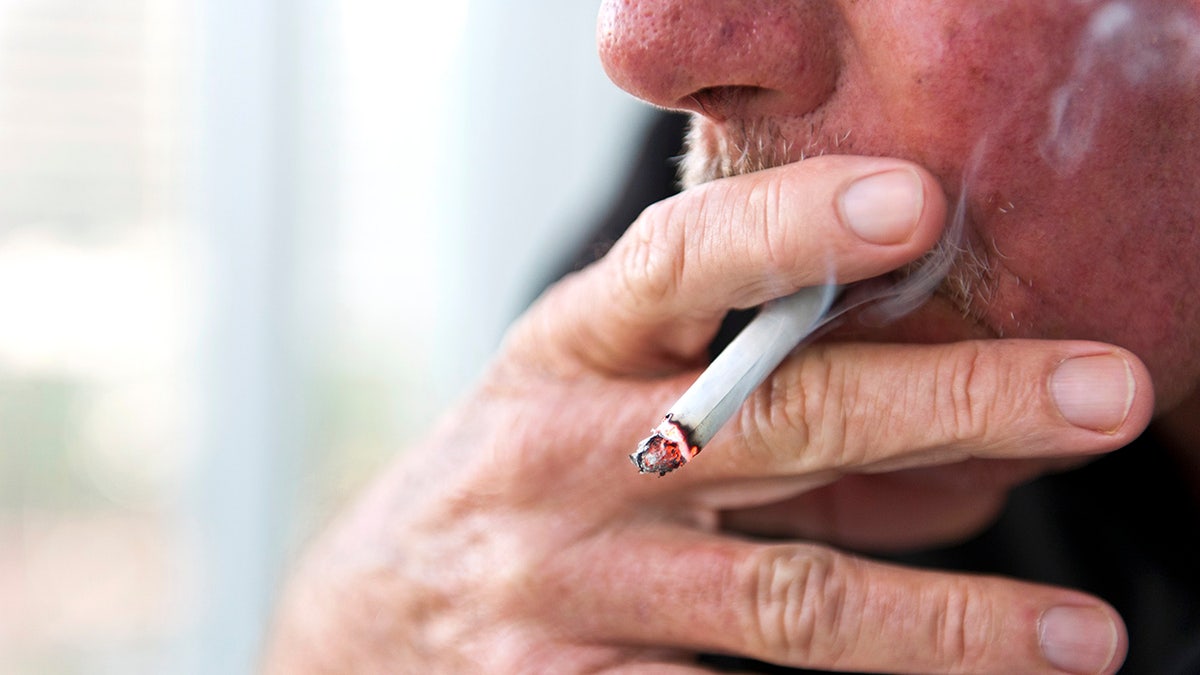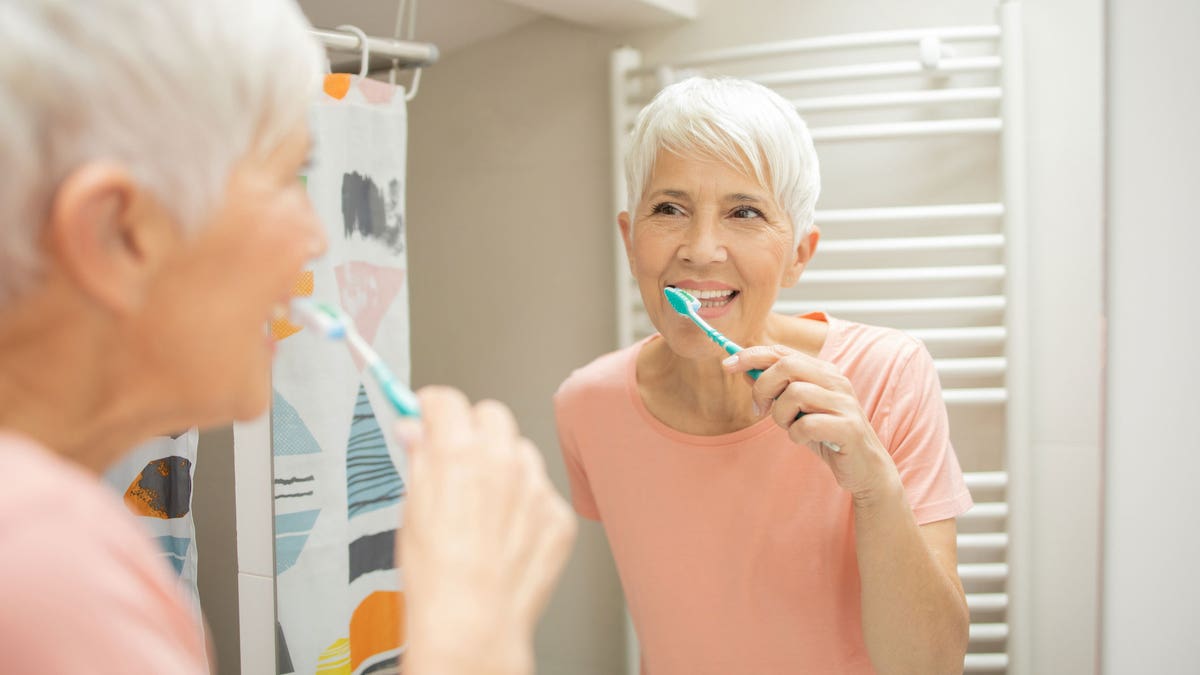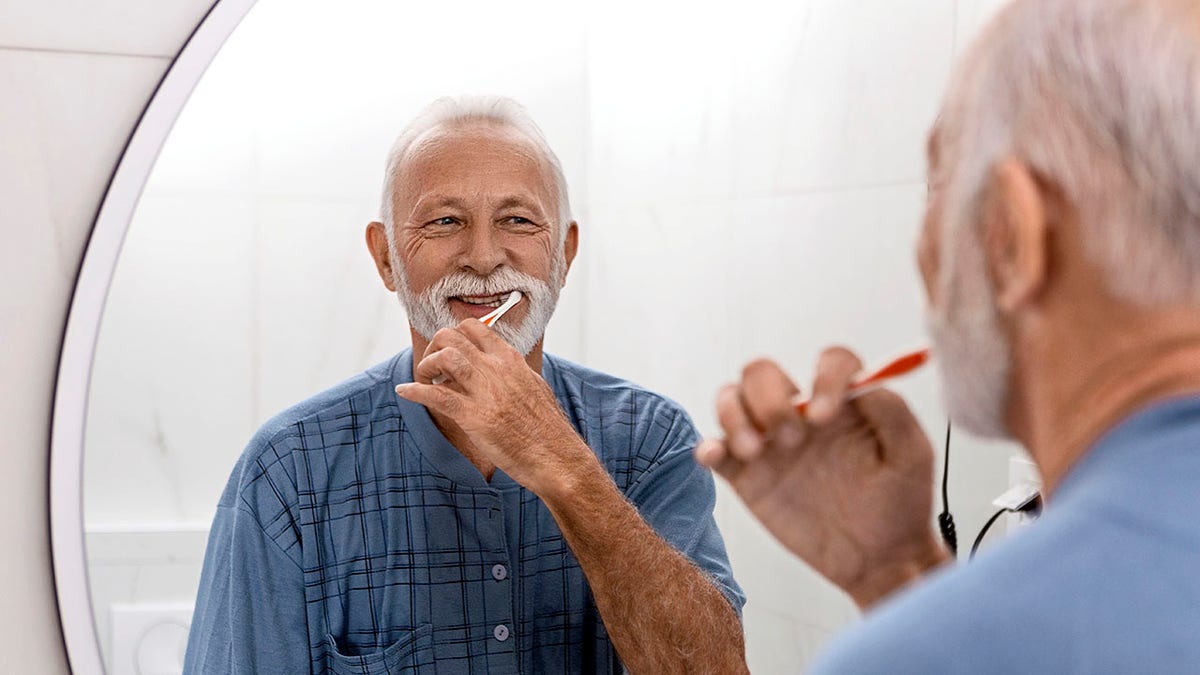The dentist shares symptoms of “Boca Quimio”
Dr. Rajiv Saini, a periodontal dentist and specialist in Katy, Texas, discusses one of these lesser -known side effects of chemotherapy and radiation for cancer patients.
NutNow you can listen to the Fox News items!
Some can assume that losing your teeth is just a part of big.
About 11% of adults between the ages of 65 and 74 have lost all teeth, according to 2020 data from North -Americans for the control and prevention of diseases (CDC), and this number increases to one in five to 75 years and more.
But according to experts, this is not inevitable. Dental professionals shared the following tips to prevent teeth loss and increase general health.
1. Protect the gum’s health
About two out of three adults over the age of 65 are treating some form of gum disease, according to an AARP report recently published.
6 simple ways to protect your hearing now before it’s too late, according to experts
Clinical experts cited in the report, including Dr. Uchenna Akosa, Deputy Professor and Director of Rutgers Health University Associates at New Jersey, warns that bloody gums can indicate a much deeper problem.
“Even if you have not lost teeth, the gum’s disease deteriorates your ability to chew hard food,” Akosa said to Aarp. “This will affect your nutrition and can put you at risk of malnutrition in the future.”
If the gums bleed when brushing or if you look sensitivity or recession, these are signs to schedule a dental visit. (Istock)
Gum disease that is not treated can also destroy the bones that keep their teeth in place and can interfere with nutrition and chewing.
Studies have shown that gum disease is also a source of chronic inflammation in the body, which can contribute to the risk of dementia. A meta -analysis of about 34,000 people found that the older adults who had lost all teeth were 1.4 times greater than developing dementia, as Aarp cites.
The publication also points to previous research that links gum disease with other health risks, such as heart attack, stroke and cancer.
About 11% of adults between the ages of 65 and 74 have lost all their teeth.
Experts recommend focusing on early prevention. If the gums bleed when brushing or if you look sensitivity or recession, these are signs to schedule a dental visit.
Periodic cleaning and professional reviews can capture gum problems before they have dental losses or other health effects.

People who had lost all teeth had a risk of 1.4 times to develop dementia, according to the AARP. (Istock)
AARP reports that changing to an electric teeth brush, brushing twice a day for two minutes, and using a wire of water are effective ways to protect the health of the gums.
Dr. David Frey, a cosmetic dentist in your perfect smile at Beverly Hills, California said that she often recommends water flasters, especially the largest waterpik-in larger patients.
“It is especially valuable for patients with arthritis, limited mobility or traditional floss problems,” Frey told Fox News Digital.
2. Make measures to prevent dry mouth
Saliva plays an essential role in the neutralization of acids and the protection of dental enamel, but the dry mouth affects almost six out of ten adults, according to AARP.
Many common medicines, including antihistamines, antidepressants and blood pressure drugs, can reduce saliva production, making the mouth more prone to tooth decay, to gums’ infection, according to WebMD.
Ozempic is ruining your teeth? What to know about the impact on dental health
To prevent dry mouth, AARP recommends drinking water regularly, rinse your mouth after eating, asking your dentist about the prescription strength of fluoride toothpaste and using dry mouth rinses such as biotena or ACT.
3. Personalize your dental visits
Contrary to the six -month standard review rule, AARP states that dental care schedules must be customized.
A report doctor said that there is nothing “magical about a six -month review”: some people may only need to go once a year, while others, especially those with chronic conditions, may need more frequent visits.

The recommended frequency of dental visits is not a unique size, according to AARP. Some people may just need to go once a year, while others, especially those with chronic conditions, may need more frequent visits. (Istock)
According to Frey, oral health problems in major adults often go unnoticed, especially those related to bite alignment.
“Bite -related problems are often a source of headache and headache,” Fox News Digital told Fox. “The audience has simply been not informed that the tension, desalineation and dysfunction of the jaw can manifest in ways that seem not related at first sight.”
Click here to get the Fox News app
Frey noted that the position of the bite and the health of the jaw may reveal the causes of chronic discomfort.
“When I combine the 3D image with a close examination of the teeth (worn surfaces, small fractures and fools), it often reveals that the muscles around the head and the neck are not in harmony with the bite.”
4. Explore financial aid options
Only three out of 10 adults over 65 have dental insurance, according to the American Dental Association and Medicare do not usually cover clean, fillings or other routine procedures.

According to experts, many regular medicines can reduce saliva production, making the mouth more prone to decay. (Istock)
This financial gap often leads people to jump out completely dental attention, which can cause more (and expensive) more serious problems in the future.
AARP suggests studying dental savings plans, local dental schools or community clinics on a sliding scale if coverage is a problem.
5. Adopt healthy habits
Smoking is one of the main contributors to tooth loss.
CDC data show that smokers are up to three times more likely to lose all teeth than non -smokers.

CDC data show that smokers are up to three times more likely to lose all teeth than non -smokers. (Istock)
And, while the drops of sugary coughing or hard sweets may seem harmless, they can hurt the dental enamel over time, they warn experts.
Change to gum or sugar sweets that contains xylitol can help prevent cavities and support better oral health, said Akosa to Aarp.
6. Restoration appearance
One of the most important misconception about aging and dental health is that worn and faded teeth are something that simply accept, according to Frey.
“It’s not just about revitalizing your teeth, it’s about revitalizing the person.”
“A delicate and fine porcelain sheet can restore vitality, color and shape the teeth once, improving the smile and the general appearance,” Fox News Digital told.
“And it is not just about cosmetics, but also of restoring health, confidence and proper function.”

AARP reports that changing to an electric teeth brush, brushing twice a day for two minutes, and using a wire of water are effective ways to protect the health of the gums. (Istock)
According to Dr. Frey, “it’s not just about revitalizing the teeth, it’s about revitalizing the person.”
Click here to register -you are in our health newsletter
For those who seek to shine their smile, Erin Fruundorf, founder of Boca Orthodontic and Whitening Studio of St. Louis, recommends seeing a dentist before trying laundering treatments, according to the AARP report.
For more health items, visit www.foxnews.com/health
“Office treatments are still the safest and most effective option, while home kits and OTC products can be excellent for maintenance,” said Fruundorf.
#Dental #experts #reveal #essential #tips #prevent #loss #teeth #aging #adults
Image Source : www.foxnews.com
